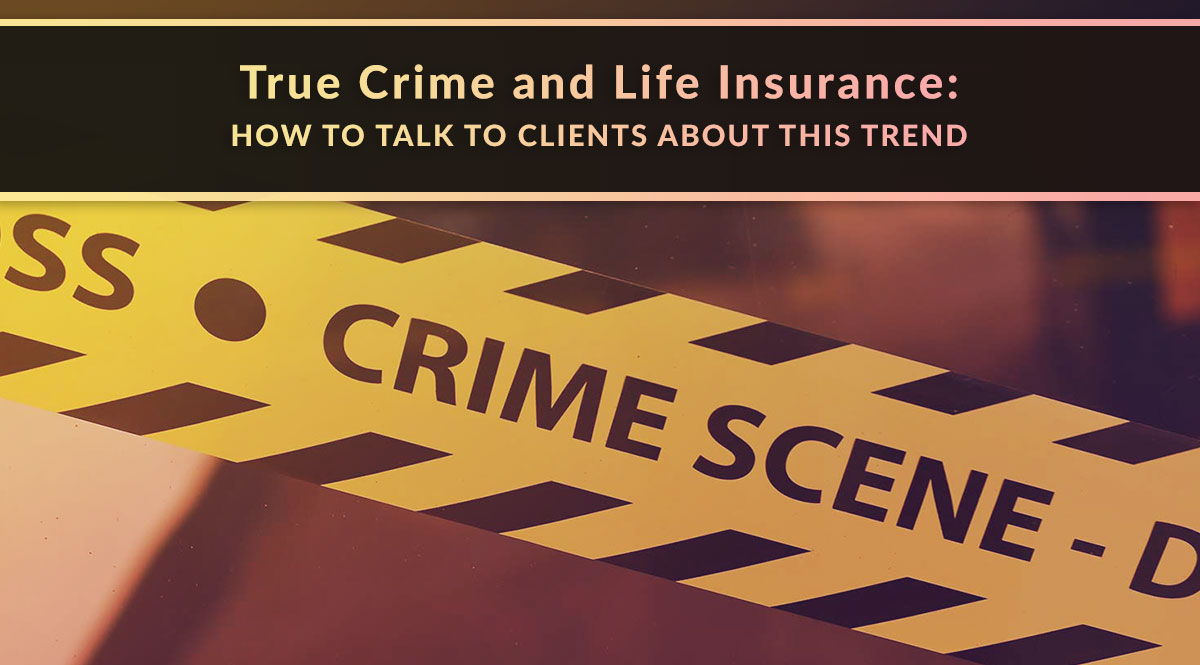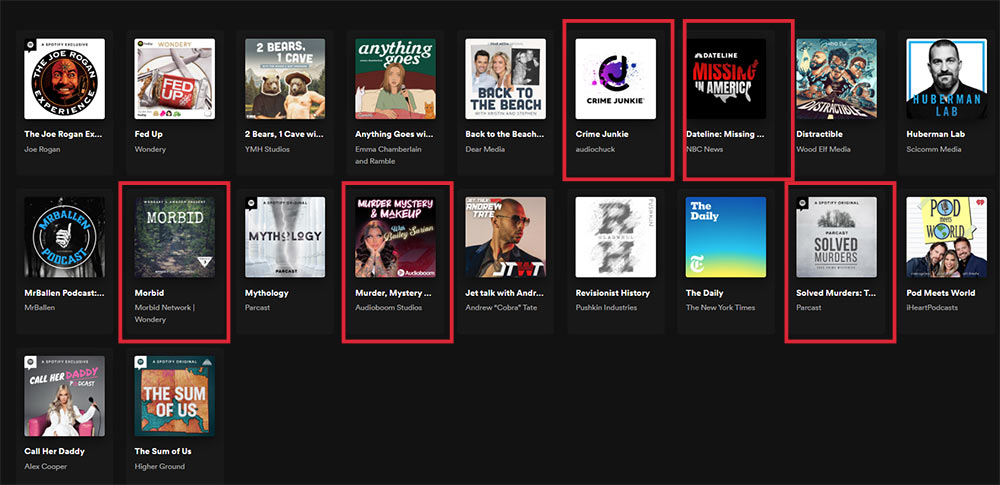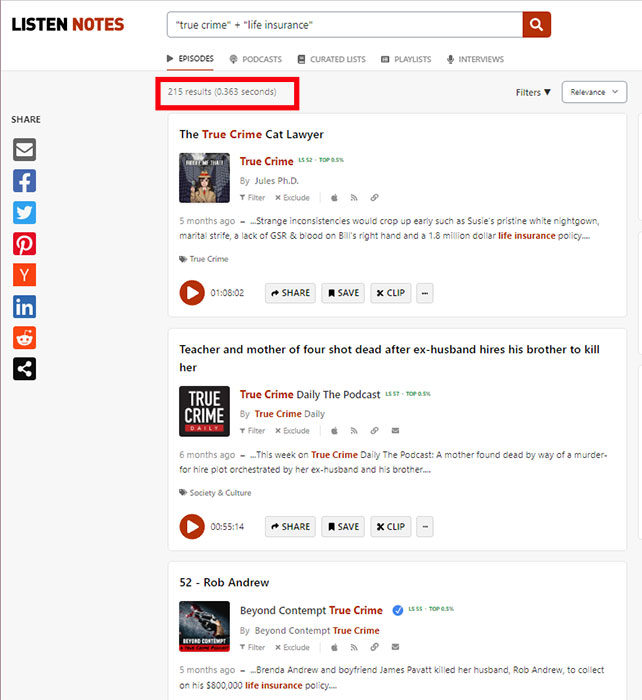
American pop culture is in the midst of a true crime obsession...and life insurance is often the motive for crime.
If you watch TV, listen to podcasts, or read books, you’ve probably noticed a surge in stories about true crime where life insurance provided a motive. This is an opportunity for us to connect with and educate consumers on the true purpose of life insurance. In this post, we’ll show you how to find these stories and tactfully address them with clients and prospects.
No time to read? Watch our video overview:
Before we go any further, let’s be clear: the goal is never to glorify criminals or exploit victims. For our purposes, the details of any particular case – other than the presence of a life insurance policy – don't even need to be mentioned. Our goal is simply to acknowledge a pop culture trend and educate prospects on the real purpose of life insurance: to selflessly provide for the ones they love.
Not a fan of true crime? You can still use the tips and approaches below to incorporate any pop culture trend into your consumer marketing. Or use them to find purely fictional crimes in movies, TV, and books that also involve life insurance.
Trend Watch: True Crime Content
First, let’s look a quick look at the true crime trend in general and the potential reasons for it.
As of 2021, true crime is the largest and fastest-growing documentary subgenre for American streaming, according to Parrot Analytics. (TheRinger.com) Documentaries are the most popular form of true crime show, ranging from the old-school (Dateline NBC) to recent releases on Amazon, Hulu, HBO, and Netflix, like The Staircase.
As far back as 2019, 50% of the nation's most-downloaded podcasts were true crime. Also that year, the second highest-earning podcast was “My Favorite Murder” – which beat out Dave Ramsey’s podcast, and was only out-earned by Joe Rogan’s podcast. (Statista) The boom hasn’t ended, either. As of this writing, Spotify’s list of the top 20 most-listened-to podcasts includes 5 true-crime podcasts.

And that’s just TV and podcasts – we haven’t even covered movies or books like Michelle McNamara’s I’ll Be Gone in the Dark. The true crime obsession is such a part of the culture that universities are studying the phenomenon. Health care providers including the Cleveland Clinic are publishing articles like this: “Is Your Love of True Crime Impacting Your Mental Health?”
Amanda Vicary, a social psychologist who teaches at Illinois Wesleyan University – and a true crime fan – did a study to find out who likes true crime books most and why. Her findings, published in Social Psychological and Personality Science, revealed that:
- Most true crime readers are women. This is backed up by data outside Vicary’s study, including by the host of "My Favorite Murder," who confirmed an 85% female audience.
- Women often use true crime stories to confront their own fears about being the victim of a crime.
- Women want insight into the psychology of a killer, as well as survival tips that might help them escape one.
Whether you enjoy true crime stories or not, there’s something about them that speaks deeply to consumers – especially women. So how do you use this information in a helpful way?
How to Find True Crime Stories that Involve Life Insurance
As we mentioned above, the goal isn't to talk further about the details of the crime itself. Instead, our goal is to use something that’s already a big part of pop culture to:
- Connect with clients and prospects using a subject many of them are already familiar with
- Educate them on what the media gets wrong or fails to mention when it comes to life insurance
- Help them understand the real role life insurance should play in their lives
And we’ll show you how to do this in a compassionate way that’s educational, not voyeuristic.
So, first things, first…if you’re not already a consumer of true crime content, how do you find specific instances that specifically involve life insurance?
Method 1: Use Google
This one’s simple – just use our two search terms in quotation marks connected by a + sign. This tells Google you only want to see results that include the specific phrases “true crime” and “life insurance.”
Example: “true crime”+”life insurance”

When we did this search, we found podcast episodes, YouTube videos, articles, TikToks, and books. That’s a lot of material to work with…and we’re just on page one of the search results.
You can also refine your search if you want a particular type of result:
“true crime podcast”+”life insurance”
“true crime episode”+”life insurance”
“true crime tv show”+”life insurance”
“true crime book”+”life insurance”
Method 2: Use ListenNotes
ListenNotes.com is a search engine for podcasts. You can use it to find specific episodes, rather than entire shows. We used the same search query as for Google – “true crime”+”life insurance” – and got 215 results.

Method 3: Use YouTube
You can use YouTube as a search engine and filter results by date or views to find recent and popular videos with our search terms. Start by entering the following into the YouTube search bar: true crime+"life insurance"
You don’t need to put true crime into quotation marks. YouTube is going to generate plenty of relevant results for that term; we only need to specify life insurance.
Next, click the filters button.

Under “Upload date,” choose the parameter you want. We picked “this year.” Now, you have a list of recent true crime videos that use the phrase “life insurance” in the title or description. You’ll get some results that aren’t a 100% match, but it’s close enough to generate results in the genre we’re looking for.

You’ll find a range of podcasts, TV shows, web exclusives, and news stories this way.
4 Tips for Bringing up True Crime Content in Your Marketing
As mentioned above, the first step is to treat true crime stories with care. Always remember we’re talking about real families and people. They are not the focus here. We're focusing on the right way to think about life insurance.
Let’s start with how to frame a true crime story for your prospects and clients.
Tip #1: Include the context
Start by explaining how you found the content. Are you a true crime fan or just a casual observer?
If you’re all-in on the true crime genre: it’s okay to be enthusiastic about what you find. Millions of people are! And if it’s 100% natural, your genuine enthusiasm will show. If you’re a regular listener or watcher of a particular show, tell the world. It will connect you to other fans of that show.
If you’re not a fan: don’t pretend to be. Instead, say something like, “I stumbled onto this [TV show, podcast, movie] and was surprised to find life insurance played a part in the story! As soon as I saw it, I wanted to share a few thoughts.”
Tip #2: Explain the real purpose of life insurance
This is what we’re here for: making sure people understand the power of life insurance. Buying life insurance is the most unselfish thing they can do – and it changes the lives of their loved ones. Even though the true crime genre has highlighted some horrible misuse of life insurance, now’s your chance to bring the focus back to love, family, charity, and selflessness.
To keep it all above-board, avoid commenting on the accused, the investigators, the judge, the jury, or anyone else in the story. By all means, express sympathy for the victim and their family, but keep any opinions about the case out of the picture.
Here are a few examples of how to do that:
- “I had to share this because I want you to know that there’s a lot more to life insurance than what you see here.”
- “The mistake here is thinking that life insurance is about money. It’s about providing for the people you love most. Despite what you see here, it’s the most unselfish thing you can do.”
- “Like any good tool, life insurance can be used the wrong way. But for those of us who see its true power, it’s a life-changing gift that shows your family how much you love them.”
If you can, follow that up with an educational tidbit about life insurance. Or the story of a client you recently helped. Or what it felt like to deliver a claim check, if you’ve had that experience. Show your prospects your experience of life insurance, as opposed to what they see in true crime stories.
Tip #3: Tap into the emotions of true crime fans
As we mentioned above, statistics show that the majority of true crime fans are women. True crime stories can be a tool for confronting and overcoming fear, or preparing for the worst.
If that’s the case, true crime fans have something in common with people who buy life insurance: they’re thinking ahead. They’re pondering worst-case scenarios. And even if they’re afraid, they’re pushing through it.
So why not use that knowledge to urge them to take another important step...and protect their loved ones with life insurance?
Here are a few examples of how to do that:
- “It’s easier to listen to a podcast or watch a show about death than it is to think about your own. But if you can do it, you have the chance to give your family a gift they’ll never forget.”
- “Life insurance isn’t scary. It’s just one of several things you can do – like creating a will and a health directive – that’s part of being a responsible human being.”
- “The right way to think about life insurance is to picture your loved ones. If you were gone, how would they get by? Would they need financial help? Where would they live? We can talk about kinds of life insurance that have benefits for you, too, but those loved ones are the most important reason to give me a call.”
Tip #4: Don’t overdo it
Even if you’re a true crime fan, moderate how often you talk about it with clients and prospects. This is just one topic of many you have to talk about. There’s a reason every day isn’t #throwbackthursday.
That’s our look at true crime and life insurance!
Are you a fan of true crime content? Have clients or prospects ever asked you about life insurance because they saw it in a true crime story?
